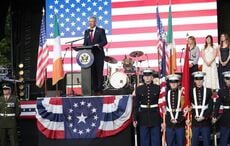Recently, Senator Barack Obama asked me to join a distinguished group of leaders who will advise him on Irish American affairs. As the chairman of the Friends of Ireland in the U.S. House of Representatives, it was a great personal honor to be chosen to serve on this senior advisory panel.
I know both Senator Obama and Senator Joe Biden share my longstanding desire to strengthen Irish-American political, economic and cultural ties. And I am certain that an Obama administration will make the pursuit of permanent peace and stability in Northern Ireland a top priority, will enact comprehensive immigration reform that keeps America 's doors open and will improve the quality of life of Irish Americans, and will restore America 's standing in the world.
Like many of us, Obama and Biden come from Irish stock.
Senator Obama's great, great, great grandfather on his mother's side set sail from Co. Offaly in 1850, arriving in New York and eventually settling in Ohio. Senator Biden, who was born in the Irish American stronghold of Scranton, Pennsylvania , traces his ancestry to Co. Mayo.
Since the eighties, Obama has lived and worked on the South Side of Chicago, a neighborhood known for its large and prominent Irish American community. This experience has given him a first-hand account of the remarkable contributions made by Irish immigrants to the United States.
I strongly believe the peace process in Northern Ireland is one of the most significant foreign policy accomplishments in recent memory. And the role the United States played in that effort was indispensable.
The peace accord in Northern Ireland, based on principles developed by George Mitchell, should be viewed as a model for successful conflict resolution around the globe. I know that Senator Obama agrees, and the creation of the advisory panel is an indication of the commitment his administration will bring to securing lasting peace and reconciliation in Northern Ireland.
Just last week, he welcomed the latest report of the Independent Monitoring Commission that concluded the IRA does not present a threat to peace or democratic politics in Northern Ireland. That report was another reminder that the sectarian conflict is now well and truly over.
But while Northern Ireland experiences a period of unprecedented transformation, progress needs to be made by the political parties on the outstanding issues such as the devolution of policing and justice powers.
I am confident that as President Barack Obama will be an enthusiastic supporter of the historic power-sharing government. And I am thrilled that he has pledged to visit the island of Ireland during his administration.
By contrast, John McCain has spent years ridiculing and minimizing U.S. efforts to help resolve the Troubles.
In an article in Foreign Affairs, he said President Bill Clinton's efforts were "romantic" and accused him of undertaking his tireless work for peace in order to curry favor with Irish Americans.
He criticized the decision to grant Gerry Adams a visa, a development now considered crucial to the success of the peace process.
He claimed our role in Northern Ireland was severely damaging our relationship with Great Britain.
Yet in a speech before Congress in 2003, British Prime Minister Tony Blair publicly thanked America for its support of the peace process.
Quite simply, in the long march towards peace and stability in Northern Ireland, John McCain has been on the wrong side of history every step of the way.
Many people have now heard the inspiring story of how Barack Obama's father came to the U.S. from Kenya on a student scholarship in the 1959. On many occasions, Barack Obama has discussed how his father's remarkable journey, and his own multi-ethnic family, have helped shape his view of the immigrant experience.
As a result, he has developed a unique view of the "melting pot" that helps make America great.
While John McCain has shifted his position on immigration reform to appeal to his right wing base, Senator Obama has remained steadfast in his determination to fix a broken system. He attended a huge march in Chicago on behalf of immigration reform and played a leading role in drafting comprehensive immigration reform legislation.
As president, he will forge a bi-partisan consensus to strengthen border security and fix the dysfunctional immigration bureaucracy.
And John McCain? He was for comprehensive immigration reform before he said he would vote against it.Here in the United States, Irish Americans are suffering through the economic downturn like everyone else.
As a member of the House Ways and Means Committee, I know Senator Obama will reverse the Bush tax cuts for the wealthy, tax cuts John McCain intends to preserve, and offer significant relief for working and middle class Americans.
He will enact an emergency economic plan to jump start the economy, provide a middle class tax cut of up to $1,000 for 95 percent of workers and their families, provide quality and portable health care coverage for every American, and offer a tax credit that will make college more affordable.
Whether it is immigration reform, the economy, energy policy or war and peace, the differences between Barack Obama and John McCain could not be more dramatic or profound.
The Obama-Biden team is offering Americans an exciting blueprint for change while John McCain is running to give George W. Bush and his failed agenda four more years.
As Senator Obama said in Denver, this country has reached a defining moment in history. We either can look to the future with Barack Obama or return to the past with John McCain.




Comments